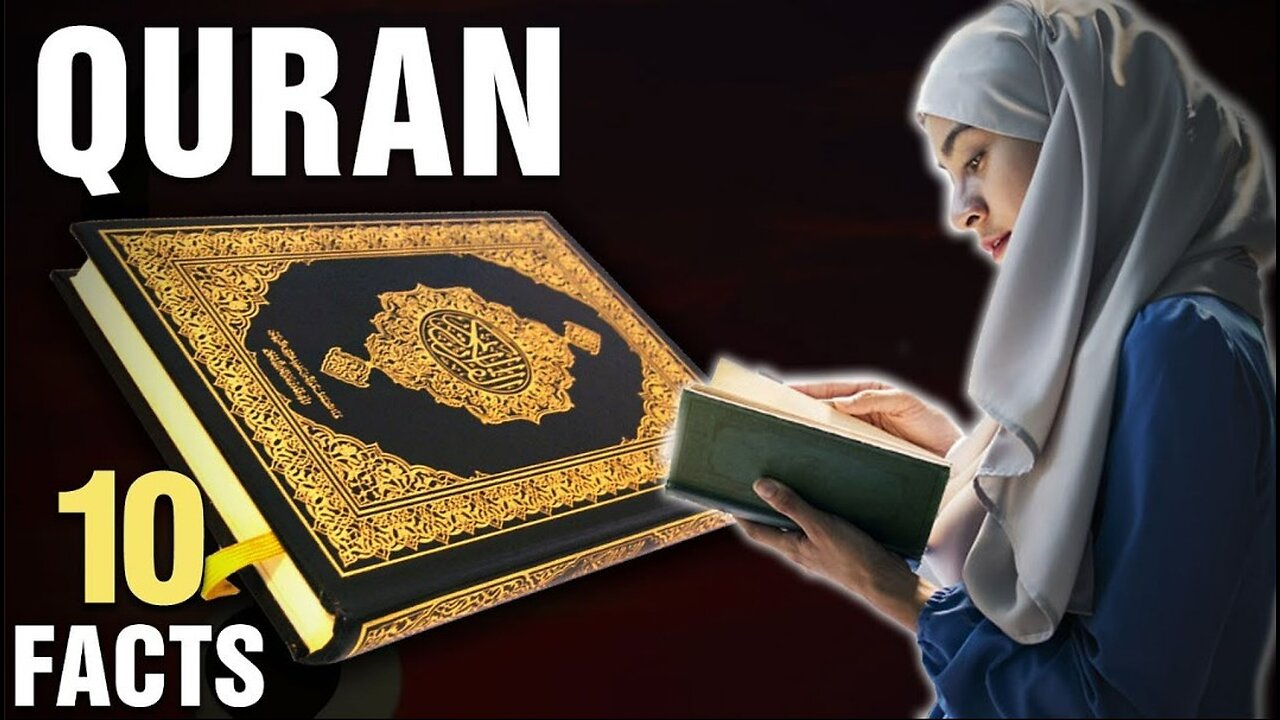Premium Only Content

About Quran The Holy Book of Islam
The Quran, also spelled as Qur'an or Koran, is the holy book of Islam. It is considered the literal word of God (Allah) as revealed to the Prophet Muhammad, peace be upon him, over a period of approximately 23 years. The Quran is written in classical Arabic and is divided into chapters called "Surahs," which are further divided into verses called "Ayahs."
Here are some key details about the Quran:
1. Revelation:
The Quran is believed by Muslims to be the final and complete revelation from God, confirming and superseding previous scriptures like the Torah and the Bible. It was revealed to Prophet Muhammad through the angel Gabriel, starting in the year 610 CE and concluding in 632 CE.
2. Structure:
The Quran consists of 114 Surahs of varying lengths, with the longest Surah being Al-Baqarah (The Cow) and the shortest Al-Kawthar (Abundance). The Surahs are further divided into Ayahs, and the total number of Ayahs in the Quran is over 6,000.
3. Themes:
The Quran addresses various aspects of life, theology, morality, guidance for personal conduct, and legal principles. It covers topics such as monotheism, the nature of God, the importance of faith, the responsibilities of individuals and society, and the consequences of human actions.
4. Linguistic Miracles:
Muslims believe that the Quran is a linguistic miracle, and its eloquence and style are considered unparalleled. The Quran challenges people to produce something similar to it if they doubt its divine origin.
5. Preservation:
Muslims believe that the Quran has been preserved in its original form without any alteration since its revelation. The process of memorization and written compilation during the Prophet's lifetime contributed to its preservation.
6. Recitation:
The Quran is meant to be recited and memorized by Muslims. The recitation of the Quran, especially in its original Arabic form, is highly emphasized in Islamic worship and rituals.
7. Guidance for Life:
Muslims consider the Quran a comprehensive guide for all aspects of life. It provides guidance on matters of spirituality, morality, family, commerce, law, and more. Muslims turn to the Quran for answers to ethical dilemmas and for spiritual reflection.
8. Spiritual Significance:
The Quran is a central part of Islamic spirituality. Muslims believe that reciting and reflecting upon its verses brings spiritual benefits, and it is recited in daily prayers, especially during the month of Ramadan when Muslims aim to complete the entire Quran through nightly prayers called Tarawih.
9. Translations:
While the original Quran is in Arabic, translations into various languages exist to make the message accessible to non-Arabic speakers. However, Muslims believe that the Quran's true essence is best captured in its original language.
The Quran is not only a religious scripture but also a source of inspiration and guidance for millions of people around the world, shaping the beliefs, values, and practices of the Islamic faith.
-
 2:44:02
2:44:02
TimcastIRL
9 hours agoMedia Warns Of Civil War Following Charlie Kirk Assassination | Timcast IRL
439K329 -
 2:59:56
2:59:56
Laura Loomer
9 hours agoEP143: Remembering Charlie Kirk (1993–2025)
97.5K69 -
 58:04
58:04
Man in America
12 hours agoCharlie Kirk’s Assassination—An URGENT WARNING for America
96.5K105 -
 1:22:15
1:22:15
Glenn Greenwald
11 hours agoCharlie Kirk Assassination Fallout: U.S. Reps Call for Censorship; Do Graphic Videos Serve the Public Interest? Plus: WIRED Reporter on the Dark Side of Surrogacy | SYSTEM UPDATE #513
209K182 -
 1:48:36
1:48:36
Right Side Broadcasting Network
17 hours agoLIVE: President Trump Attends the Yankees Baseball Game - 9/11/25
183K26 -
 1:54:32
1:54:32
Badlands Media
11 hours agoBadlands Media Special Coverage - FBI Press Conference on Charlie Kirk's Assassination
150K20 -
 1:06:19
1:06:19
BonginoReport
12 hours agoManhunt Underway for Charlie Kirk’s Assassin - Nightly Scroll w/ Hayley Caronia (Ep.132)
321K254 -
 1:11:42
1:11:42
Flyover Conservatives
20 hours agoStructural Architect Destroys 9.11 Narrative... What Really Happened? - Richard Gage AIA | FOC Show
103K20 -
 1:51:14
1:51:14
Precision Rifle Network
15 hours agoS5E1 Guns & Grub - Charlie Kirk's "sniper"
59.9K18 -
 13:09:12
13:09:12
LFA TV
23 hours agoLFA TV ALL DAY STREAM - THURSDAY 9/11/25
419K95